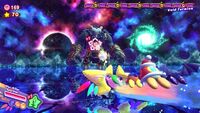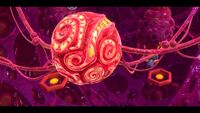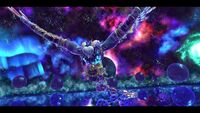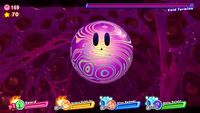Suite: The Star-Conquering Traveler
| ||||||||||
|
| ||||||||||
"Suite: The Star-Conquering Traveler"[2] is a collective name for Void Termina's boss battle themes. It first appeared in Kirby Star Allies and was composed by Hirokazu Ando.[1]
Movements[edit]
As its name indicates, "Suite: The Star-Conquering Traveler" is a suite, and thus consists of movements. The first four correspond to Void Termina's phases in the boss battle, and the fourth also playing when battling Void Soul. The final movement is Void's theme, and is the only part of the suite that didn't appear in the vanilla version of the game. Each movement has its own title, provided on the Kirby Star Allies: The Original Soundtrack. A medley of the first four movements can be found as track 114 in the game's Jukebox.
"First Movement: Star-Crushing Fun"[edit]
| “ | Rise! Oh, Dark Lord of Despair! Crush the stars! Lay waste to care! (x 4) - Inst. - Rise and cover the land in sorrows! May your symphony of emptiness bring the end of all tomorrows! (x 2) |
” | — Lyrics from Void Termina, True Destroyer of Worlds (Demon God Form) pause screen text |
The first movement is titled 第一楽章:星砕きの戯れ (First Movement: Star-Crushing Fun). It features orchestral instrumentation with trumpet, flute, and violins as the leading instruments. Another characteristic is its incorporation of "Song of Supplication" into its melody, which is also reused in the second and third movements.
It can be found as track 215 in the game's Jukebox.
"Second Movement: Vessel of the Embryo"[edit]
The second movement is titled 第二楽章:胚子の器 (Second Movement: Vessel of the Embryo). This movement serves as the intermezzo of the suite. Notably, it uses less traditional orchestral instrumentation and is much calmer and quieter compared to other movements, though it is still tense. It fades in and out smoothly from the preceding and following movements.
"Second Movement: Vessel of the Embryo" is also used as the rest area theme for the first five bosses in The Ultimate Choice on the Soul Melter EX difficulty. It can be found as track 217 in the game's Jukebox.
"Third Movement: Sorrowful Wings of the Heavens"[edit]
| “ | Rise! Oh, Dark Lord of Despair! Crush the stars! Lay waste to care! (x 4) - Inst. - Upon your wing, dark judgment bring! May your symphony of tragedy cause the end of everything! (x 2) |
” | — Lyrics from Void Termina, True Destroyer of Worlds (Angel Form) pause screen text |
The third movement is titled 第三楽章:哀と渾天の翼 (Third Movement: Sorrowful Wings of the Heavens). It's similar to "First Movement: Star-Crushing Fun", except it features organs as its leading instrument and adds mixed choir.
It can be found as track 219 in the game's Jukebox. The intro to the track can only be heard if listening to it by itself, or if Kirby loses a life and starts the phase over from the beginning. Otherwise, it just fades in from the Second Movement.
"Fourth Movement: Hope of Birth"[edit]
The fourth movement is titled 第四楽章:生誕の希望 (Fourth Movement: Hope of Birth). It begins with a slow organ intro linking from the previous movement, before launching into an electric guitar arrangement of "Green Greens" (in minor key) and the Void Termina leitmotif from the first three movements.
It can be found as track 221 in the game's Jukebox. The track was remastered in Version 2.0.0 onwards for better sound quality. The Version 1.0.0 original arrangement can still be found on Kirby Star Allies: The Original Soundtrack, however.
"Final Movement: Sparkling Star"[edit]
The fifth movement is titled 最終楽章:煌めき星 (Final Movement: Sparkling Star). The name appears to be derived from the Sparkling Stars that appear in Kirby's Dream Land (which are きらきらぼし Kirakira-boshi, as opposed to the song's 煌めき星 Kirameki-boshi). It can be found as track 227 in the game's Jukebox. According to Shinya Kumazaki's commentary at the Kirby 30th Anniversary Music Festival, this movement serves as a requiem.[3]
The first part is the same as "Fourth Movement: Hope of Birth"—being a hard rock arrangement of "Green Greens" and the "Song of Supplication" motif—but it then transitions to a second part that consists of a somber, slow-paced piano rendition of the theme. The two parts are separated by a 135 beat-per-minute 3/4 time 16-bar transition. At around 4:27 into the track, a melancholic chiptune starts to kick in (a reference to the fact that Kirby's Dream Land was first released in Japan on April 27th, 1992). Orchestral and chiptune elements play alongside each-other as the song progresses; around 5:42, it transitions into a largely chiptune section that mimics the original Game Boy iteration of "Green Greens". The song loops at roughly 6:14, making it one of the longest tracks in the Kirby franchise, beaten only by the Kirby's Return to Dream Land Deluxe Jukebox version of "Supreme Ruler's Coronation - OVERLORD".
Other appearances[edit]
All five movements were performed live at the Kirby 30th Anniversary Music Festival, along with "Prelude: Into the Distant Sea of Stars" and "Last Friends". This medley was arranged by Megumi Ohara.
Names in other languages[edit]
| Language | Name | Meaning |
|---|---|---|
| Japanese | 組曲:星羅征く旅人 kumikyoku: seira yuku tabibito |
Suite: The Star-Conquering Traveler 組曲 (kumikyoku) means "suite"; a group of songs played in sequence, typically divided into movements. 星羅 (seira) is an obsolete term for a group of stars in a line. It is used in a metaphorical sense for a large number of things in a line, like stars in the sky. 征く (yuku) means "to conquer" or "to subjugate". 旅人 (tabibito) means "traveler". |
References
- ↑ 1.0 1.1 Kirby Star Allies Jukebox
- ↑ Kirby 30th Anniversary Music Festival
- ↑ This Japanese wiki page about "Suite: The Star-Conquering Traveler" mentions Kumazaki's statement, and Tweets made at the time of the Music Festival's livestream (Twitter link
 , Twitter link
, Twitter link  ) corroborate it.
) corroborate it.




